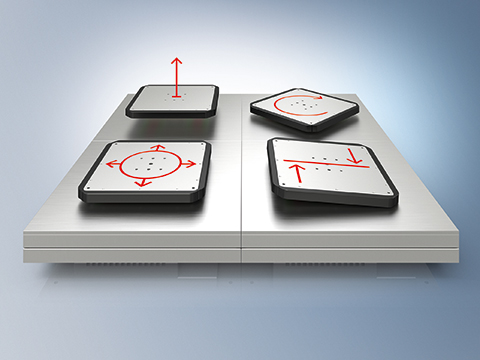
Posted to News on 30th Apr 2025, 13:30
Can maglev reduce manufacturing downtime?
What really grinds manufacturers' gears? Costly downtime and worn-out machinery. Maglev technology takes friction out of the equation, reducing the need for both scheduled and unscheduled maintenance activity. Here, Mark Richards, UK sales manager at Beckhoff Automation UK, explains the long- and short-term benefits of maglev technology for maintenance engineering.

Traditional manufacturing systems rely on mechanical bearings and rollers, which suffer from friction-induced damage over time. This ongoing degradation leads to breakdowns, frequent maintenance and costly replacements. Magnetic levitation (maglev) technology addresses these issues by using electromagnetic fields to suspend and transport objects without physical contact.
By eliminating friction, maglev significantly reduces wear and tear on machinery. This results in longer lasting equipment operating with greater precision, while reducing maintenance requirements. In industries like steel production and aerospace manufacturing, where moving heavy components can compound this problem, this technology has proven to be a very valuable tool.
Maglev in smart factories
The rise of Industry 4.0 has led to the widespread adoption of IoT, AI and automation in smart factories. Maglev technology is becoming an integral part of this transition, offering seamless integration with software-driven manufacturing processes.
One very important aspect of smart factories is an uninterrupted uptime. By minimising maintenance and cleaning needs, maglev systems ensure production runs smoothly. It also complements PC-based control solutions and IoT-based monitoring systems well, where predictive analytics can help prevent hardware failures before they occur.
The combination of smart software and frictionless hardware is particularly valuable in highly regulated industries. In semiconductor manufacturing and pharmaceutical production, contamination control is critical. Traditional mechanical transport systems can introduce microscopic particles that would compromise the products - a problem that maglev-based conveyors navigate without difficulty.
Energy efficiency and sustainability
Efficiency in manufacturing extends beyond production speed but also encompasses resource usage and environmental impact. In addition to lower maintenance requirements, maglev technology is inherently energy efficient. The lack of friction means that less power is required to maintain movement, leading to reduced operational costs and carbon footprint. Maglev systems also have no need for lubricants and frequent part replacements, minimising waste material throughout its machining lifespan.
Traditional conveyor systems usually require multiple machines to accommodate directional changes and varying speeds. In contrast, maglev-based transport solutions enable controllable, omnidirectional movement with a single unit, streamlining robotic assembly lines and other automated processes.
It is in the optimised production layouts, where maglev transport systems like Beckhoff's XPlanar rises to another level. The motion surface comprises of modular tiles that can be arranged freely depending on current requirements. This also means that installing transport pathways to meet new demands is simple.
In manufacturing, scaling up makes downtime more costly. XPlanar tiles can have their position detection powered separately, which allows the system to pick up exactly where it left off after tool changes or maintenance work.
Personalised manufacturing has become increasingly important in many industries, which requires flexible manufacturing set-ups. The simultaneous operation of different mover sizes on an XPlanar system eliminates the need to modify transport systems, which can lead to delays especially when processing a large variety of products and packaging sizes.
Maglev technology was once a futuristic concept but is now a practical solution that enhances efficiency and minimises downtime. This increased system availability is largely thanks to the sophistication of automation software. All functionalities are integrated into one PC-based control system, like TwinCAT, which streamlines user-machine interactions.
As manufacturers prioritise efficiency, precision and sustainability, maglev technology is emerging as a transformative solution. Reducing downtime is becoming increasingly important, making flexible, frictionless transport a significant step forward in manufacturing innovation.
Want the latest machine building news straight to your inbox? Become a MachineBuilding member for free today >>

















